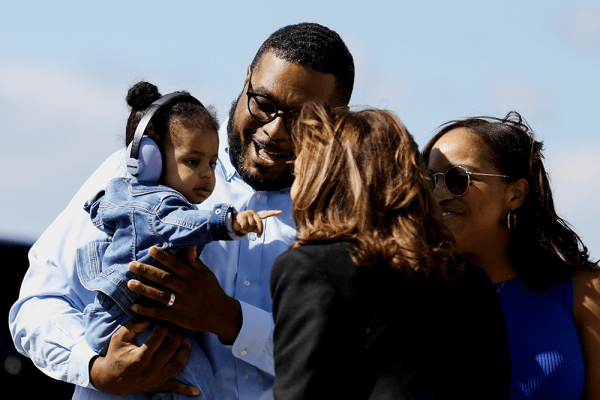About a month into her presidential campaign, Vice President Kamala Harris has begun to reveal glimpses of her proposed White House policy agenda. The big-ticket items — child tax credits, housing incentives, and inflation relief on groceries — are aimed at the segment of the population most affected by the skyrocketing cost of living: young working families. It’s a focus child welfare advocates are welcoming.
Children are often keenly aware of their family’s financial situation, said Lauren Reliford, policy director with Children’s Defense Fund, especially those whose basic needs hang in the balance.
“Children living in poverty experience it as toxic stress,” she said, recalling her own childhood waiting in lines for government assistance, knowing her mother was worried about food, clothes, and shelter. “My mom’s stress was my stress.” [Editor’s note: Lauren Reliford previously worked as political director at Sojourners.]
The Harris plan includes reviving the American Rescue Plan’s expansion of the Child Tax Credit to $3,600 per qualifying child, and $6,000 for children in the first year of life. It also includes subsidies for local governments to increase affordable housing and $25,000 for first time home buyers. As food prices continue to strain household budgets, Harris proposed having the Federal Trade Commission monitor and penalize corporations that engage in price gouging groceries.
Democrats have urged the nominee to set a policy agenda to match the wave of hopeful enthusiasm that followed President Joe Biden’s announcement that he would not seek reelection, throwing his support behind Harris. While some, like universal basic income advocate Stacey Rutland, have urged her to take bigger swings, others have cautioned that the most ambitious goals, including raising the corporate tax rate from 21 percent to 28 percent and billions of dollars in incentives for affordable housing, will require Democratic control of Congress to achieve.
But, Reliford pointed out, the pandemic-era Child Tax Credit expansion was a bipartisan success. During the COVID-19 pandemic, Congress raised the maximum credit from $2,000 to $3,600 per child under 6 and $3,000 for children between 6-18. And it changed a refundability rule that had kept the lowest income families from qualifying for the full amount. Analysts say that Harris’s plan is likely to include changes that increase eligibility, given that Gov. Tim Walz, Harris’s vice-presidential candidate, enacted a statewide fully refundable child tax credit in Minnesota.
Harris’s proposal is likely to significantly reduce childhood poverty if passed. The 2021 Child Tax Credit lifted nearly three million children above the poverty line in 2021. Congress let the expansion expire, and the rate of children living in poverty more than doubled.
A tax credit putting money directly into the hands of parents is a uniquely effective way to ensure that the money has the greatest impact on kids, Reliford said. Pandemic-era programs showed that parents do spend the credits on things their kids need, including the child care that allows them to continue to work in their own jobs.
“This isn’t giving parents free money — it’s investing in the people who make the economy run,” Reliford said.
Tax credits have a different set of pros and cons than other social programs, said Liz Theoharis, executive director of the Kairos Center for Religions, Rights, and Social Justice and co-chair of the Poor People’s Campaign. On the one hand, most tax credits are not designed to help the poorest Americans whose incomes are too low to pay taxes. However, the pandemic extension showed that a fully refundable credit could be effective. One benefit of the credit, Theoharis said, is that it applies to everyone, making it broadly popular, and thus politically viable.
There’s a moral benefit as well, she said. In her view, rigid eligibility criteria for entitlements contribute to stigma. Eligibility standards, like work and citizenship requirements, generate judgments that paint those who don’t qualify as undeserving. However, when eligibility criteria isolate a group based on the severity of their need — like low income or disability — those who want to cut social programs will vilify those who need it.
Theoharis said the best government solutions leave less room for blaming individuals and focus more on fixing systemic problems.
“We have all of these boogeymen out there but what we’re hoping to see, and seeing, and pushing [to see is] that there are real solutions,”
Political constraints — whether fiscal or social — end up hurting kids the most, Reliford said. Kids have no control over whether their parents work, where they live, or who they live with. Rarely does policy begin with a critical look at the systems that deliver educational, health, and nutritional services to kids. Nor do they address removing barriers that are beyond kids' control.
“Children past, present, and future have suffered because adults have not considered their reality when designing programs to serve them,” she said.
A flexible, broad tax credit is a key component of a child-centric policy agenda, but Theoharis reiterated the need for continued attention to the other policy areas as well. The money goes further when housing and groceries are affordable. Strengthening child care systems will allow parents to stabilize their own income. There’s no single policy that will end child poverty, much less inequality, Theoharis said, but there shouldn’t need to be.
“Somehow when the rich and powerful speak, they get to ask for everything, but when poor people speak, they only get to ask for one thing,” she said.
During the pandemic, both Theoharis and Reliford said, the vulnerability of American families came to the forefront, opening ambitious conversations on what it would take to strengthen the social systems we all rely on. As the pandemic has waned, so have those conversations, Reliford said. Regardless of where Harris’s policy conversation begins, earnest effort to improve social policy must be a priority, she said.
Got something to say about what you're reading? We value your feedback!






